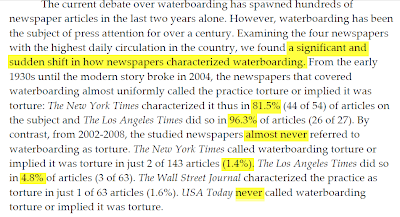(updated below)
A newly released study from students at Harvard's John F. Kennedy School of Government provides the latest evidence of how thoroughly devoted the American establishment media is to amplifying and serving (rather than checking) government officials. This new study examines how waterboarding has been discussed by America's four largest newspapers over the past 100 years, and finds that the technique, almost invariably, was unequivocally referred to as "torture" -- until the U.S. Government began openly using it and insisting that it was not torture, at which time these newspapers obediently ceased describing it that way:
Similarly, American newspapers are highly inclined to refer to waterboarding as "torture" when practiced by other nations, but will suddenly refuse to use the term when it's the U.S. employing that technique:
As always, the American establishment media is simply following in the path of the U.S. Government (which is why it's the "establishment media"): the U.S. itself long condemned waterboarding as "torture" and even prosecuted it as such, only to suddenly turn around and declare it not to be so once it began using the tactic. That's exactly when there occurred, as the study puts it, "a significant and sudden shift in how newspapers characterized waterboading." As the U.S. Government goes, so goes our establishment media.
None of this is a surprise, of course. I and others many times have anecdotally documented that the U.S. media completely changes how it talks about something (or how often) based on who is doing it ("torture" when the Bad Countries do it but some soothing euphemism when the U.S. does it; continuous focus when something bad is done to Americans but a virtual news blackout when done by the U.S., etc.). Nor is this an accident, but is quite deliberate: media outlets such as the NYT, The Washington Post and NPR explicitly adopted policies to ban the use of the word "torture" for techniques the U.S. Government had authorized once government officials announced it should not be called "torture."
We don't need a state-run media because our media outlets volunteer for the task: once the U.S. Government decrees that a technique is no longer torture, U.S. media outlets dutifully cease using the term. That compliant behavior makes overtly state-controlled media unnecessary. In his proposed Preface to Animal Farm, George Orwell noted how completely the British Government during World War II was able to control media content without formal or official censorship:
The sinister fact about literary censorship in England is that it is largely voluntary. Unpopular ideas can be silenced, and inconvenient facts kept dark, without the need for any official ban. . . .
So far as the daily newspapers go, this is easy to understand. The British press is extremely centralised, and most of it is owned by wealthy men who have every motive to be dishonest on certain important topics. . . . At any given moment there is an orthodoxy, a body of ideas which it is assumed that all right-thinking people will accept without question. It is not exactly forbidden to say this, that or the other, but it is ‘not done’ to say it, just as in mid-Victorian times it was ‘not done’ to mention trousers in the presence of a lady.
In 2007, Rudy Giuliani was widely mocked for explaining that whether a particular technique constitutes torture "depends on who does it" -- rarely does one find such an unapologetically nationalistic theory of morality and even language -- but that's exactly the same standard not only our government but also our establishment media has adopted.
The real issue here is the same one raised by the malleable, manipulative use of the term "Terrorism." It's to be expected that governments will try to propagandize their citizenry by applying completely different standards -- even completely different language -- to their own conduct as opposed to when other countries engage in exactly the same conduct. But when the media copies that behavior (as ours does), they're amplifying and bolstering government propaganda rather than critically scrutinizing and debunking it. Isn't that a fairly serious problem?
The behavior is even more egregious when government dictates (as of now, this is no longer torture) lead directly to the change in media behavior. And the ultimate effect of this joint government/media obfuscation is to further entrench the destructive notion that we're different, exceptional, better, and therefore we deserve even a different language to describe what it is that we do. This Harvard study documents the exact process by which the political class convinces itself and others that bad and illegal things are, by definition, only what those Bad, Other Foreign Countries do, but never ourselves.
UPDATE: For a classic example of the Everything-Is-Intrinsically-Different-When-We-Do-It syndrome, see the update to the prior post.



Shares